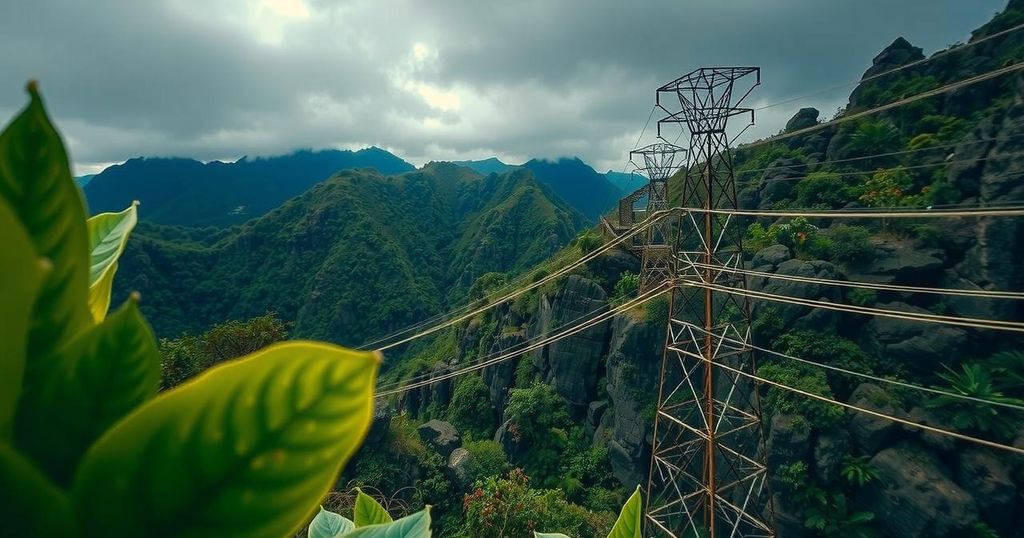Ecuador’s Energy Crisis: 14-Hour Blackouts Amid Drought and Governance Challenges
Ecuador faces severe power outages lasting up to 14 hours daily, affecting everyday life for its 17 million citizens. Allegations of neglect by past administrations have emerged amidst claims of drought exacerbating the crisis. Criticism surrounds the government’s response and the implementation of a controversial power-generating barge. As the situation remains unresolved, Ecuadorians demand accountability and sustainable energy solutions.
Since mid-September 2024, Ecuador has been enduring widespread power outages lasting up to 14 hours daily, severely impacting a population of 17 million. The country’s constitution mandates the government to provide electricity as a public service, critical for daily life. The power cuts have not only obstructed basic activities but also led to tragic incidents, such as pedestrians navigating dark streets and increased difficulties for businesses, with reports of substantial economic losses. Reflecting on the impacts of these outages, some citizens, like Rómulo Frank, have shared stories of financial burdens when home appliances fail due to inconsistent power supply. Others, such as Rodrigo Padilla, emphasize the detrimental effects on children’s education. Increased electricity bills have further exasperated the situation, with many complaining about receiving high charges despite limited access to electricity. The situation worsened significantly after President Daniel Noboa’s election in April 2024, with claims that previous government neglect, particularly by former Energy Minister Andrea Arrobo, had contributed to the energy crisis. Allegations emerged suggesting that Arrobo had failed to prepare for the impending crisis resulting from drought conditions affecting hydroelectric output. Evidence from private communications indicates that Noboa was warned about these risks before the power outages escalated markedly in September. Despite government assurances on addressing the crisis, conflicting messages have left citizens frustrated. On multiple occasions, officials cited drought as the primary reason for prolonged outages, although critics argue that diversifying Ecuador’s energy matrix is essential, leveraging other sources such as thermoelectric and renewable energies. The government introduced a USD 115 million barge project intended to bolster energy supplies, yet transparency concerns and potential allegations of influence peddling have emerged surrounding its contracting. Critics have also scrutinized the inadequate energy output promised by the floating power plant in relation to Ecuador’s demand. Amidst these issues, President Noboa acknowledged in a recent interview that Ecuador’s energy crisis stems from historical underinvestment in infrastructure by previous administrations. He has pledged investments in various energy projects to mitigate the ongoing challenges, yet as of now, the blackouts have persisted for 14 hours daily, continuing to strain both individuals and the economy.
Ecuador has been grappling with significant power outages since September 2024, prompting national distress among its population. The outages have been attributed to a combination of drought-induced shortages in hydroelectric generation and alleged lack of prior investment in the energy sector by past governments. The current administration’s responsiveness to the crisis has been marred by conflicting statements regarding the causes and potential solutions, further complicating an already dire situation. Citizens have voiced increasing frustration regarding inadequate communication from the government and the negative repercussions on education and local businesses, raising questions about the government’s strategy moving forward.
In conclusion, Ecuador’s ongoing electricity crisis has far-reaching implications for the country’s social and economic fabric. The 14-hour daily blackouts have highlighted deficiencies in energy infrastructure and governance. Citizens have suffered financially and socially due to insufficient planning and investment. Continued scrutiny of governmental action and commitment to diversifying energy sources is crucial for alleviating the current challenges and ensuring a reliable energy future for Ecuadorians.
Original Source: globalvoices.org




Post Comment